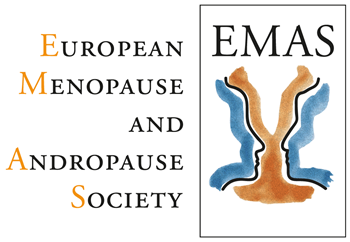Host: Welcome to today’s podcast. Long-term benefits of MHT: A metabolic syndrome perspective. This episode is part of a podcast series supported by Abbott. The content is solely the responsibility of EMAS, the European Menopause and Andropause Society. All our episodes are available in English, Spanish, Mandarin, and Russian, and you can find them on any of the most popular podcast platforms.
In today’s episode, Irene Lambrinoudaki, professor of endocrinology at the medical school of the National and Kapodistrian University of Athens, Greece, editor-in-chief in Maturitas and scientific director of the European Menopause and Andropause Society, will help us understand the effects of menopausal hormone therapy on the components of the metabolic syndrome.
Prof. Irene Lambrinoudaki: Transition to menopause is associated with an adverse cardiometabolic profile, with body fat redistribution, favoring visceral adiposity and concomitantly, increasing insulin resistance. Lean body mass does also decrease during the menopause transition, this body composition changes increase the risk of Diabetes Type 2. LDL cholesterol also increases while the protective HDL cholesterol decreases after menopause. While it is not clear whether age or menopause affect blood pressure, the incidence of new-onset hypertension increases during the first years after the menopause.
Menopause, therefore, is a risk factor for developing metabolic syndrome, a term used to describe a cluster of abnormalities including abdominal obesity, arterial hypertension, low HDL cholesterol, high triglycerides, and high blood glucose concentrations. A combination of at least, three of them is needed for diagnosis of the metabolic syndrome.
Epidemiological evidence suggests that post-menopausal women are at a threefold higher risk of developing metabolic syndrome and abdominal obesity compared with premenopausal women, after controlling for age and BMI.
The risk increases further as age advances after menopause. Interestingly, the risk of abdominal obesity is highest during the first five years after menopause, surgical menopause is also associated with a 50 percent higher risk of metabolic syndrome in comparison with natural menopause.
In general, estrogens exert a beneficial effect on lipid profile since they decrease total cholesterol and LDL cholesterol. Whereas, they increase the protective HDL cholesterol concentrations.
Defect on triglycerides depends on the root of administration. Oral estrogens increase, while transdermal estrogens have a neutral effect on triglyceride concentrations.
In general, progestogens have little impact on the estrogen-induced reductions in total cholesterol and LDL cholesterol. In contrast to their opposing effect on the estrogen-induced increases in the protective HDL cholesterol.
The degree of this effect depends on the type of the progestogen being milder with progesterone, dydrogesterone, and more pronounced with medroxyprogesterone and Norethisterone acetate.
Menopausal hormone therapy prevents the menopause-associated increase in total and especially in abdominal body fat mass. In postmenopausal women without diabetes, menopausal hormone therapy improves insulin resistance and can reduce the incidence of new-onset Type 2, diabetes mellitus by 30%.
Furthermore, menopausal hormone therapy improves glucose control in women with pre-existing diabetes.
The effect on glucose metabolism is more pronounced with the oral route as compared to the transdermal route of hormone administration.
Finally, menopausal hormone therapy improves floor-mediated dilation, which is a marker of endothelial function and reduces arterial stiffness.
In summary, if menopausal hormone therapy is administered for the management of menopausal symptoms or the prevention of osteoporosis, it also confers cardiometabolic benefits by improving the lipid profile, carbohydrate metabolism, and endothelial health.
Host: Today, Professor Irene Lambrinoudaki discussed the effects of menopausal hormone therapy on the cardiometabolic profile. Thank you for listening to today’s episode. We hope it will be valuable for your clinical and research practice. Stay safe.
[END]


